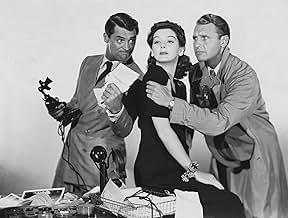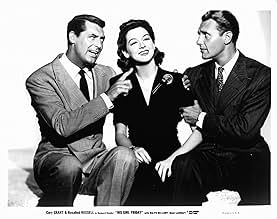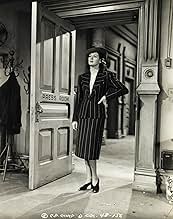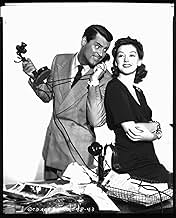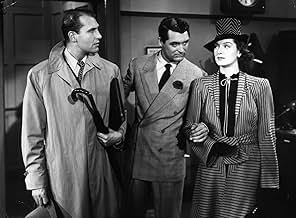Quando l'abile reporter Hildy Johnson annuncia di voler lasciare il mondo del giornalismo per dedicarsi completamente alla vita domestica, il suo editore, nonchè ex-marito, ricorre ad ogni m... Leggi tuttoQuando l'abile reporter Hildy Johnson annuncia di voler lasciare il mondo del giornalismo per dedicarsi completamente alla vita domestica, il suo editore, nonchè ex-marito, ricorre ad ogni mezzo per convincerla del contrario e per conquistare di nuovo il suo cuore.Quando l'abile reporter Hildy Johnson annuncia di voler lasciare il mondo del giornalismo per dedicarsi completamente alla vita domestica, il suo editore, nonchè ex-marito, ricorre ad ogni mezzo per convincerla del contrario e per conquistare di nuovo il suo cuore.
- Premi
- 2 vittorie e 1 candidatura
Trama
Lo sapevi?
- QuizOne of the first films (preceded by Palcoscenico (1937)) to have characters talk over the lines of other characters, for a more realistic sound. Prior to this, movie characters completed their lines before the next lines were started.
- BlooperWhen Bruce Baldwin comes to the press room late in the movie, an electric fan and small shelf on the wall to the left of the door both completely disappear. Both have been there in all previous scenes and both reappear after this scene.
- Citazioni
[describing Bruce]
Walter Burns: He looks like that fellow in the movies - Ralph Bellamy.
- Curiosità sui creditiOpening credits prologue: It all happened in the "Dark Ages" of the newspaper game--when to a reporter "Getting that story" justified anything short of murder.
Incidentally you will see in this picture no resemblance to the man and woman of the press today.
Ready?
Well, once upon a time - -
- ConnessioniEdited into Michael Jackson's This Is It (2009)
The best thing about the film IS the dialogue. Characters speak at a break-neck speed, throwing witticisms left and right as if they were candy. Many times, while one is laughing at one joke, they would miss another right after it. That is how quickly the jokes are thrown out in the film. Cary Grant and Rosalind Russell are great at spilling lines out seemingly without any problem. It's a real testament to how professional these two were (along with the rest of the cast) with the amount of verbal meat they had to chew; I can't think of an actor today that could possibly pull of the kind of dialogue that was given in this film.
The problem that I had with the film was that the dialogue was the ONLY great thing about it. Unfortunately, the characters and situations presented in the film had little sympathy and lack of any kind of real depth. The situation with the falsely accused murderer was handled poorly given the context of his predicament; instead of really caring about this person and really trying to help him become cleared of charges, the Grant and Rosalind characters instead used him for their own purposes in getting "the big scoop." Now, of course one can argue that that WAS the reason they treated him the way they did, my issue is that such a serious subject was handled in a supposed "comedic" fashion; as if it was OK that this falsely accused person can be treated in such a horrible way, simply because it handled comedically. The last-second deus ex machina that sealed this person's fate supports the idea that his story wasn't really handled with any kind of importance.
The thing the really hurt the film was the love triangle between the Grant and Rosalind characters, and the Rosalind's character's fiancé. We are told in the beginning of the film that Grant and Rosalind are divorcees, and Rosalind is set to marry her fiancé the very next day in Albany. Of course, in a film like this, we are supposed to root for the Grant and Rosalind characters to get together at the end. the problem is, the Grant character is such a manipulative creep that at the end of the film I found myself actually rooting for the fiancé to the win the girl. Three times in the movie, the Grant character manipulates the situation, causing the fiancé to be thrown in jail, and preventing the would-be married couple from leaving the city. This in turn gives the Grant character enough time to convince Rosalind that she will always be "a newspaperman." The Rosalind character isn't much better either. Throughout the beginning of the film, she keeps explaining to others that she is through with the newspaper business, that she wants to settle down, raise a family, and not have to deal with the daily grind of hunting down a story. Well, does settling down and having a family sound like a bad thing to you? I didn't think so. Every time she tries to leave, she gets bogged down and distracted by the story (many times through the very fault of the Grant character). It gets so bad, that when the fiancé comes to her, begging her to leave with him, she brushes him off like a fly, barely acknowledging him. Even worse, when the fiancé's mother comes into play, the Rosalind character actually ALLOWS Grant to have her kidnapped and taken away! "His Girl Friday" would've worked if the filmmakers had cared enough about the characters than they did about the dialogue. The actor playing the fiancé did a thankless job; without much to work with, he actually created a character we cared about more so than the two leads. Sure he was a little simple, but that's a lot more than can be said about the other two. At the end of the film, I thought to myself "these two characters were divorced before the film started. Based on all the manipulative actions these two had throughout the story, is there any evidence that they'll stay together once the movie is over?" Maybe they deserve each other, because they certainly don't deserve anyone else.
- flipboy923
- 6 set 2008
- Permalink
I più visti
Dettagli
- Data di uscita
- Paese di origine
- Lingue
- Celebre anche come
- His Girl Friday
- Luoghi delle riprese
- Azienda produttrice
- Vedi altri crediti dell’azienda su IMDbPro
Botteghino
- Lordo Stati Uniti e Canada
- 296.000 USD
- Tempo di esecuzione1 ora 32 minuti
- Colore
- Proporzioni
- 1.37 : 1
Contribuisci a questa pagina




